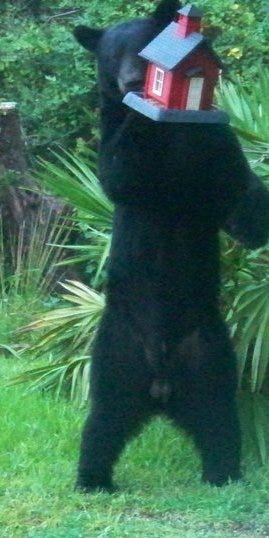
Tuesday, during April’s Florida Wildlife Commission meeting at FAMU in Tallahassee, FWC Commissioners will hear rules drafted for a limited bear hunting season presented by commission staff. These rules follow a statewide, 2012 bear management plan including the West Panhandle Bear Management Unit (WPBMU), made up of Escambia, Holmes, Okaloose, Walton, and Santa Rosa Counties. The plan establishes maintaining at least 200 bears with the necessary habitat to support them in the WPBMU.
According to the FWC, 2012 was the same year FWC Commissioners approved removing the black bear from the list of threatened species while creating a new rule maintaining it illegal to kill a bear or possess or sell bear parts. Due to population numbers, the state closed hunting of black bear completely in 1994. Estimates at the time were between 300 and 500 black bears across Florida.
The FWC estimated 3,000 in the state by 2002. The commission said the population represented “one of Florida’s conservation success stories.” However, along with black bears making a comeback, the commission reported receiving 400 percent more bear-related calls over the last decade.
Brad Wellnecker, president of the South Eastern Dog Hunters Association, said he doesn’t have the experience of hunting black bears since they were protected before he started hunting in Santa Rosa County, but he compared their increased numbers to an increased alligator population. “If you let alligators go, they will come up in people’s ponds. I have firsthand experience on that (when they) started coming into my grandmother’s pond.”
With the FWC moving toward establishing a bear hunting season, Wellnecker said, “I’d have to commend the FWC going ahead to take steps before something like that happens,” expressing concern over his two daughters walking over to their grandmother’s house in Holley. He said the Holley-Navarre area sees an abundance of bears due to the nearby reservation. Wellnecker also described an incidence with his cousin, who was outside working. “He heard something in the garbage can and thought it was someone taking it out.” Wellnecker said his cousin saw about a 400 lb black bear.
During the February 4 FWC meeting, when staff first presented on current bear research, adopt regionally-focused management, and look at sustainable hunting as a bear population management measure, staff presented initial framework for how hunting bears in Florida could proceed. Research presented determined the black bear population could sustain a 20 percent mortality rate annually without negative effect and so staff recommended limited hunting be a part of this amount within each BMU, which would include road accidents and removing individuals due to conflict.
FWC staff estimated a $100 in-state permit and $300 out-of-state permit for limited special opportunity hunts with a limited take by BMU. Staff also suggested a single week-long season in the fall and excluded hunting over feed or with dogs. Staff decided harvest numbers should be conservative until years of experience and data have been collected.
Tuesday’s meeting is a step closer toward a black bear hunting season. Keep up with the Santa Rosa Press Gazette as this story moves forward to see when and if the FWC will announce the start of a bear hunting season.
This article originally appeared on Santa Rosa Press Gazette: FWC may approve hunting bears
